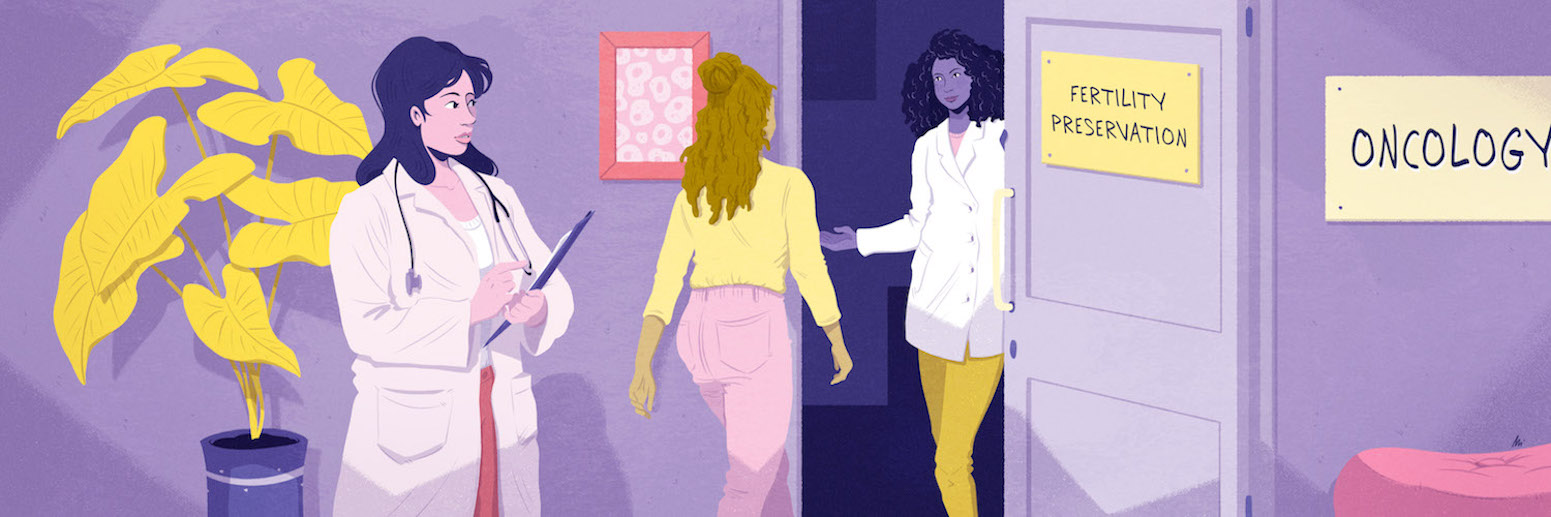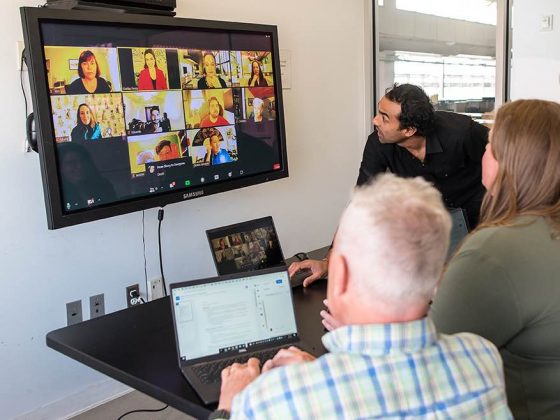It was the end of the first pandemic summer, when Edyta, a 35-year-old active entrepreneur from Łódź, Poland, received an email informing her that she had been diagnosed with breast cancer metastasised to the lymph nodes.
Naturally, her first thoughts turned to whether she would survive. Despite the difficulties getting appointments in those days of lockdown, she managed to book a consultation with a professor with more than 40 years’ experience. That’s how she started a journey that would end up putting at risk her prospects of starting a family. By the time she was made aware of the problem, it was too late.
“In every conversation with the doctors, I was asked whether I had given birth,” says Edyta. “No one explained why they were asking. I would answer that I had no children, and the doctor would move on to the next question.”
She does not recall being given any information about what chemotherapy did, or what consequences it could have, including for her future fertility.
It wasn’t until shortly before her first cycle of chemotherapy was due that Edyta was first made aware of the magnitude of what was at stake. It was in the course of an informal chat in the hospital corridor, she recalls, that her oncologist casually wondered whether she had already asked Edyta about her parenting plans. “Then something clicked for me,” she says.
She instantly plied her doctor with urgent questions about what options she had to avoid closing down her chances of motherhood, but was told that at her young age a prompt start to treatment was the priority. It was not what she wanted to hear. “Then and there, in that corridor full of strangers – patients, medical staff – I sat down, drenched in sweat.”
“I was worried about what would happen next if I survived. Would my partner want to be in a relationship with me without children?”
Seeing her distress, her oncologist then suggested that “if she really wanted”, she could check on the Internet to see what options might be open from private providers. Edyta did so, and booked an appointment at a clinic, but was told the procedure would require postponing the start of chemo by a further four weeks. Given the lack of any formal referral from the hospital, the fertility doctor was not prepared to take that responsibility.
“It’s hard to imagine what I felt at that moment,” says Edyta. “For a few days I just cried and was heartbroken. On the one hand I despaired that I had cancer, and on the other hand I was afraid for my future, for my continued life with my partner, because I knew that my partner really wanted to have children. I was worried about what would happen next if I survived. Would my partner want to be in a relationship with me without children?”
Stories like Edyta’s sadly remain all too common, right the way across Europe and beyond. The situation in Poland is particularly tough, however, not least because the country is lagging behind in having no national publicly funded fertility preservation service. Oncologists therefore lack institutional pathways for referring patients. Patients still in shock from a cancer diagnosis are left to search the Internet for private clinics that can help them preserve their fertility, and then have to pay for the procedure themselves. Private fertility clinics are not always confident – or competent – to take on cancer patients.
Who cares?
After going through treatment for breast cancer in 2019, at the age of 27, Karolina (not her real name) has been left wondering whether anyone cares about whether patients like her will be able to go on to have children. She was diagnosed and treated at a high-profile cancer centre in one of the largest cities in Poland, and says that, from the time she felt the lump until she started chemo, she visited seven doctors – oncologists, surgeons, and so on. It was the seventh who first raised with her the possibility of fertility preservation.
“I started thinking about it myself just before my first chemo, after a young radiologist I went to had asked, by chance, whether I had thought about freezing my eggs. But the tumour was growing fast, and I was a few days away from chemo, I felt I didn’t have any more time. Even if I still had time, I would have had to look for some clinics on the Internet myself.”
She did not go through the fertility preservation procedure. The only option she was offered was goserelin injections for ovarian protection. Even these she would have had to pay for herself, had one of her doctors not slightly ‘improved’ her records so she fit the reimbursement criteria (hence the request for anonymity).
“The worst thing is that I had no choice,” she says. “I probably would have hesitated, inquired, but I didn’t have that option. It would have been nice to have it. I think no one cares whether we patients have children after cancer. I’ve heard that women who have already had one child have been told that it would be enough.”
Many doctors do care, however, and there are great examples of best practice, for patients lucky enough to find them. Marta was one of the lucky ones. When she was diagnosed with breast cancer at the age of 35, she was already aware of the dangers posed to her future fertility and the need to explore options. She was treated at the Maria Sklodowska-Curie National Research Institute of Oncology in Gliwice, and has no complaints.
The topic of fertility preservation came up in conversation with doctors even before the formal multidisciplinary meeting – known as the ‘konsylium’ – at which patients are informed of the full diagnostic findings and proposed care plan. “Immediately after the konsylium, which was held on the first floor of the hospital, I was taken straight up to the sixth floor, to the office of doctor Michał Jarząb. I was admitted immediately and fully informed right away. Doctor Jarząb is the pioneer of oncofertility in Poland. He even urges patients who do not want to have children at the time of diagnosis to preserve their fertility for the foreseeable future.”
Fighting for better futures
Support and signposting
It was reading stories from America about successful pregnancies following cancer treatment that inspired Aleksandra Dryzner, to fight first for her own dreams of a large family, and then for others.
After being treated for cancer in 2017, Dryzner went on to found the group ‘Onkomama’, with the aim of supporting women like herself – and like Edyta and Karolina – and helping them find the fertility preservation services they needed, when they needed it.
“I was looking for success stories of women who gave birth after cancer. I found very few of them in Poland. I began to look more widely. It turned out that there are many such women in the United States. On Facebook groups they were posting pictures of children born after cancer. This gave me hope and courage to fight for my dreams of a bigger family.”
One important aspect of this work, she says, involves reassuring women that it is OK to aspire to more than just surviving the cancer. “I started my group to create a safe place where women experiencing cancer could find the necessary information on oncofertility on the one hand, and get emotional support on the other,” she says. “A space where no one would call them selfish, for the reason that they want to live a normal life after the disease and fulfil their dreams of becoming a mother.”
“I was looking for success stories of women who gave birth after cancer.”
The group has around five hundred members, including patients, but also oncologists, doctors and midwives. Among them is Joanna Kufel-Grabowska, a clinical oncologist at the University of Medical Sciences in Gdansk.
Kufel-Grabowska offers consultations to up to a dozen patients a month who inquire about fertility preservation. Most often they contact her via Facebook Messenger. Sometimes patients are referred to her by doctors based in other parts of Poland. “I think both doctors and patients lack awareness and knowledge about oncofertility. I think education and funding are both needed,” she says.
She herself is deeply involved in efforts to raise awareness, through her work with the Polish League Against Cancer, which conducts educational activities among doctors and patients, including a hotline that operates twice a week. The League explains that oncofertility is a new branch of medicine, which combines oncology with reproductive medicine, and was recognised as a separate medical specialty in the US in 2015.
No national, funded fertility service
The lack of any national fertility service remains a major barrier however. While cancer treatment is reimbursed and available, there is no public fertility preservation programme for oncology patients in Poland, no formal pathway for patients and no funding from the National Health Fund. “Poland is at the tail-end of Europe in this regard,” says Robert Spaczyński, chief National Consultant for Gynaecological Endocrinology and Reproductive Medicine.
According to the ‘Female fertility preservation’ report published by the European Society of Human Reproduction and Embryology (ESHRE), at least one of the procedures related to preservation of reproductive cells or ovarian tissue is partially or fully reimbursed for cancer patients in most of the European Union countries surveyed. Among the Central and Eastern European countries, Bulgaria, Croatia, Hungary and Slovenia have such an offer for patients. “In some countries there is full reimbursement, in some there is an element of co-payment. In Poland, there is not even partial support,” says Spaczyński.
Whether a cancer patient will retain a chance to become a parent after cancer therefore depends largely on his or her prior knowledge, determination, the doctor’s initiative and, ultimately, the financial resources of the patient’s bank account.
The cost of freezing sperm is about 400 zlotys (€80); freezing ovarian tissue costs closer to 2,000 zlotys (about €400); while extracting and freezing oocytes can cost anything from around from 5,000 to 10,000 zlotys (€1000 to €2000) – that’s the equivalent of one to two average monthly salaries. If a patient has no access to that sort of money, “Then fertility preservation does not happen,” says Spaczyński.
Extracting and freezing oocytes costs around from 5,000 to 10,000 zlotys – that’s the equivalent of one to two average monthly salaries
Slightly disheartening is the fact that the current situation is a step back from previous years. Poland did have a nationwide in vitro fertilisation (IVF) treatment programme between 2013 and 2016, launched by the Ministry of Health and financed with public funds. This gave oncology patients, amongst others, reimbursement for treatment to preserve their fertility. Though the procedure was not widely used in those years, says Spaczyński, cancer patients’ fertility needs were both “addressed and funded.”
Today they are neither addressed nor funded. The programme was shut down by the ruling Law and Justice (PiS) party after it came to power. So far, no alternative solution with nationwide access and reimbursement has emerged.
Quite why Poland remains without any national fertility service is hard to understand, says Marta Górna, chairwoman of the Nasz Bocian (Our Stork) Association for Infertility Treatment and Support for Adoption. The Association has been operating since 2002 and describes itself as the voice of Polish patients struggling with unintended childlessness. “I imagine that one of the issues on whether or not to launch a fertility preservation programme for cancer patients may be the ‘in vitro issue’,” Górna suggests. “Maybe the problem is that launching such a programme is just the first step. It would have to be followed by the second step, which is IVF reimbursement and IVF consent. The IVF procedure, to put it mildly, does not always have supporters in Poland,” she says.
This lack of political support is exacerbated by a cultural taboo around the whole topic of IVF in Poland, says Kufel-Grabowska. “It is seen as worse than cancer. I have had patients who gave birth to a child after cancer, thanks to the IVF procedure, they are often more willing to admit that they had cancer than to the fact that the child came from IVF.”
One former patient who feels this way told Cancerworld that she and her husband are “not ready to share with the public the information that they had a baby thanks to IVF.” Another one said that she and her husband “have decided to keep this knowledge to themselves and possibly to their close ones.”
(Some) cities step into the breach
Although people do not want to admit to using IVF, it does not mean that they do not use it. In the absence of state support for any in vitro fertilisation procedures, many local authorities are now are coming to their aid.
These are programmes organised locally, with eligibility extending only to local residents. Around forty such programmes have now been set up in Poland, according to the Nasz Bocian Association. Financed by various local government units – municipalities or provincial marshals – eligibility criteria vary.
Some local government IVF programmes, such as in Warsaw and Radomsko, specifically target cancer patients, but not all of them do. In these instances, as Górna explains, the specific needs of cancer patients can be poorly catered for. “These are often programmes only for couples, the procedure requires the entire IVF process, while in the case of oncology patients we only have stimulation and oocyte procurement. Therefore, some of these programmes are not always available to [them],” she says.
For patients in need of these services, the knowledge that their chances of starting a family could be dashed because they live in the wrong zip code can be heartbreaking.
One city that seems to be delivering well for cancer patients is Poznań, which started funding fertility services in May 2021 and is committed to continuing this until at least 2023, with more than 1 million zlotys (more than €200,000) earmarked for this purpose.
The programme covers 100% of the cost of securing fertility in men and women (oocyte freezing) and storing the material for 24 months. To date, 22 people have qualified for the programme, including nine women and 13 men, and 20 fertility preservation procedures have been carried out. Eligibility is restricted to those who have lived in Poznań for at least a year and pay taxes in the city.
Of note has been the success in developing effective referral pathways and lines of communication between oncologists and the doctors in reproductive medicine, says Kufel-Grabowska, who has worked in Poznań for most of her professional career. “I referred patients to specific doctors who had experience in fertility preservation. We had a good relationship and mutual understanding between each other. I would make an appointment for a specific day, issue the documents, and they would call back when the patient was done.”
The dividing line between local governments that do or don’t fund fertility preservation procedures is clearly visible on the map of Poland
The city of Wrocław has now followed the example of Poznań, with its own pilot programme of support for cancer patients introduced earlier this year. “It’s an excellent idea” – enthuses Alicja Chybicka, head of the Department of Bone Marrow Transplantation, Oncology and Paediatric Haematology at Wroclaw Medical University. “Now the key will be to reach patients with the right information.”
In Wrocław, the process of assessing patients for eligibility started on September 1, and by the end of the month five had qualified. There is a designated coordinator at the Lower Silesian Oncology Centre who informs patients about the possibility of participating in the pilot programme.
The dividing line between local governments willing to fund fertility preservation procedures and those that do not offer such support is clearly visible on the map of Poland. Patients from eastern regions, which are historically more traditional and religious, have worse access to such programmes.
“Patients from these cities and provinces call infertility clinics to ask about the possibility of freezing oocytes. Unfortunately, they find out that they don’t meet the requirements for reimbursement because they live in another part of the country,” says Spaczyński.
For now, there seems little prospect that this situation will change. Health Ministry officials seem reluctant to address the plight of cancer patients facing a childless future. After multiple reminders over the course of a month, they issued this response to Cancerworld’s requests for a comment. “In Poland, medical entities that perform the activities of a germ cell and embryo bank are not financed from public funds. Payment for the storage of reproductive cells is paid by the person concerned. Currently, the Ministry of Health is not working in this regard.”
It’s not what patients and doctors want to hear.
Talking parenthood means talking hope
Marta Górna argues that discussion options for fertility preservation can be an important part of patient care on multiple levels. “It gives a chance for parenthood. But it is also extremely important from a psychological point of view. The information that one can secure fertility to be a mother or father in the future is an incredibly positive message for a cancer patient who is worried about the chances of recovery. This patient sees a real chance for health and for getting back to absolutely normal life,” she says.
System-wide approaches would help to popularise oncofertility procedures, says Joanna Kufel-Grabowska. “Both education and funding are needed. Because if there is funding, doctors will have to expand their knowledge.”
While the city initiatives are partial solutions, and important in showing what can be achieved, this needs to be done at national level, Robert Spaczyński emphasises. Systems, structures and funding are all crucial: “It has to be organised by state institutions,” he says. “Our dream would be that, during the medical interview, the oncology patient would be informed routinely about fertility preservation options. Within the oncology pathway, there is space for this.”
“Systems, structures and funding are all crucial: “It has to be organised by state institutions”
“These are political decisions,” he adds. “The medical community strongly encourages funding for fertility preservation regardless of the political option, because this is becoming the standard in developed countries.”
Patients themselves want to see a clear formalised pathway. They want the future cancer patients to have it easier than they did. Aleksandra Dryzner says she wants to see oncofertility procedures be recognised as standard of care and be included in guidelines. She dreams of the day that motherhood after cancer is no longer seen as sensational.
A year and a half after finishing her chemo, Edyta is still upset at what has happened to her. “I’m alive, all is fine. But it’s hard for me to accept that someone made a life decision for me. When a family member or friend gives birth to a child – it’s very hard for me to enjoy the happiness of that woman,” she says. “It would be really good if there was someone in charge of education in the hospital, so that young women know what options they have. Most of the young patients I know have learned about fertility preservation options either from me, the media or the Internet. Unfortunately, some, like me, learn it too late.”
Karolina also remains deeply wounded by her experience. “Unfortunately, the patient is not treated as a human being, just as the next number in line,” she says. She got the green light from her doctor to try for a pregnancy two years after diagnosis. The first time the foetal egg turned out to be empty.
She plans to try again.
Illustration by Maddalena Carrai












